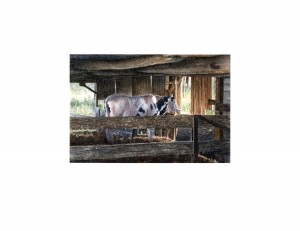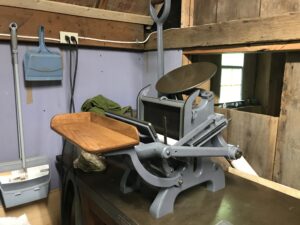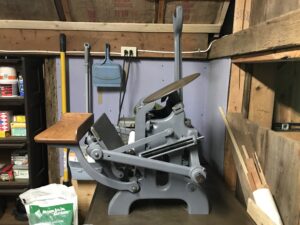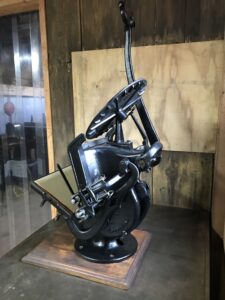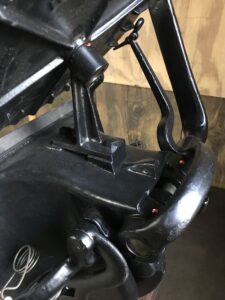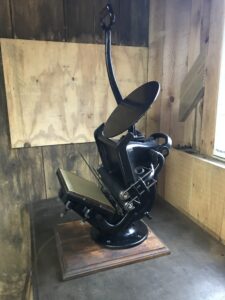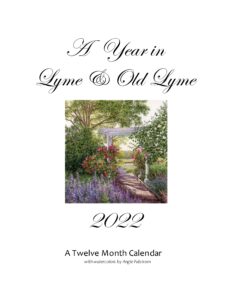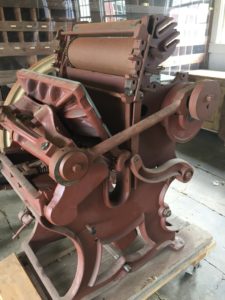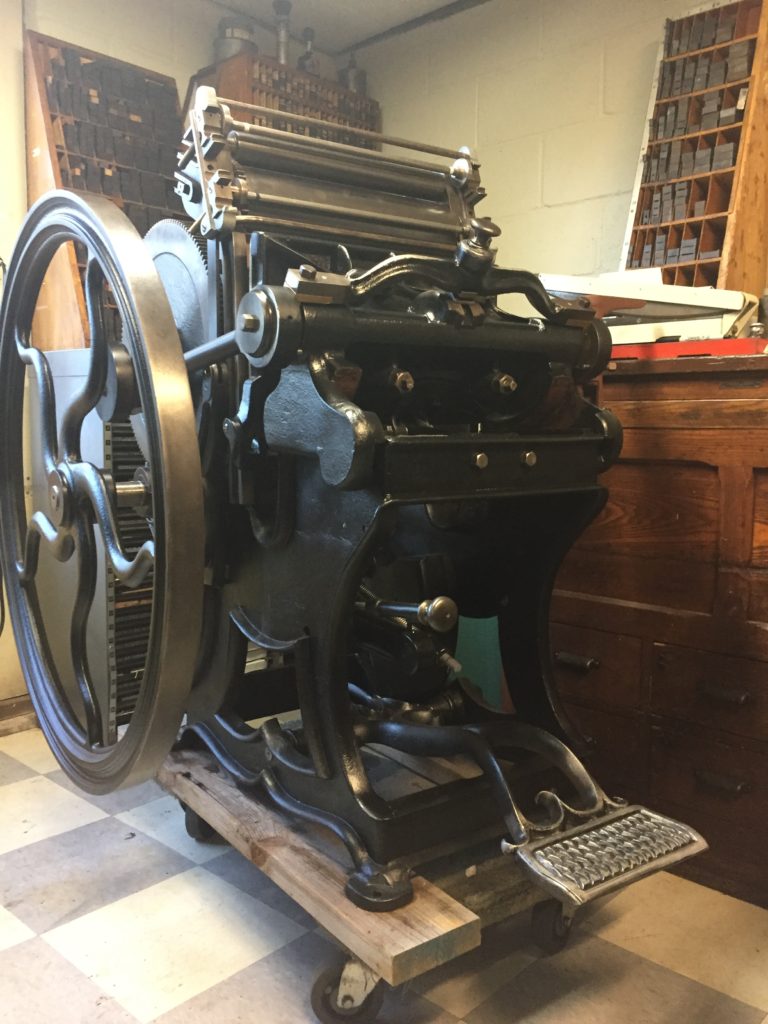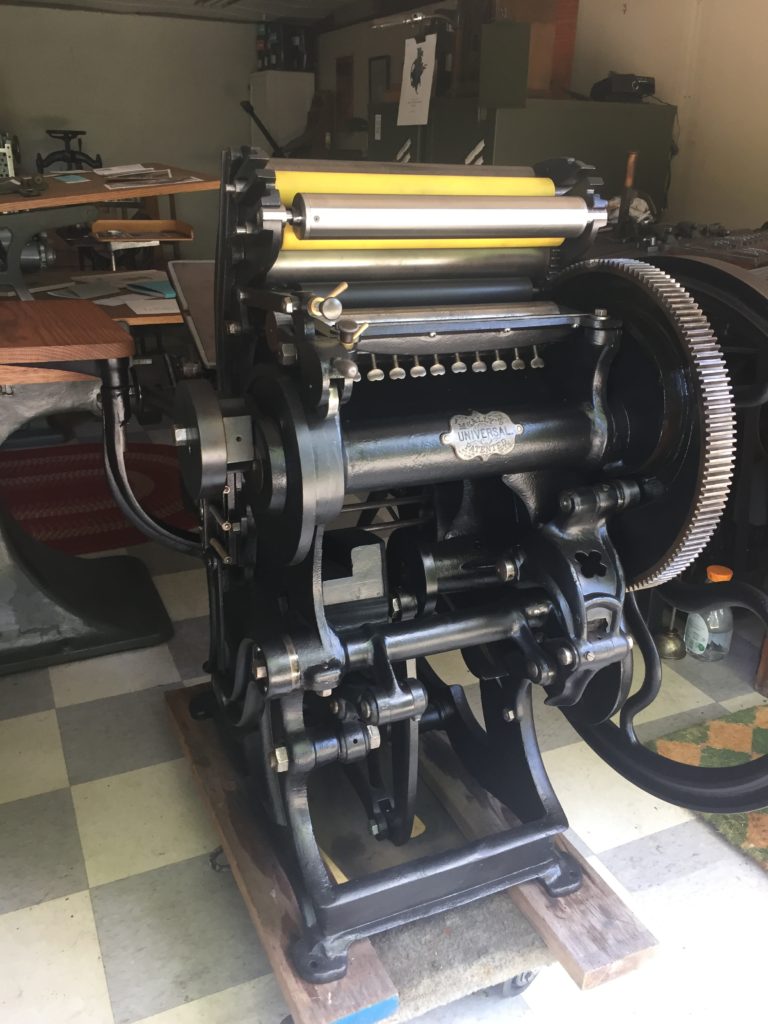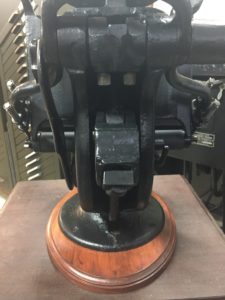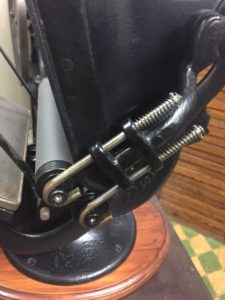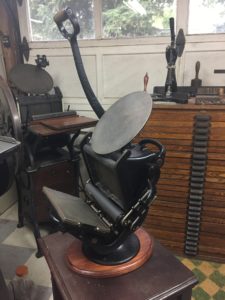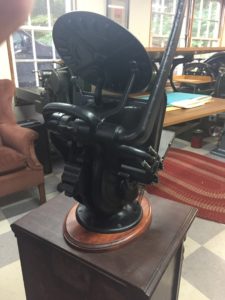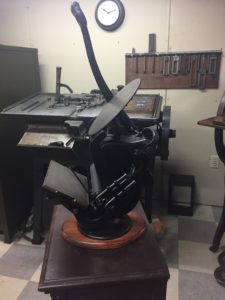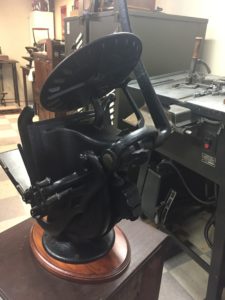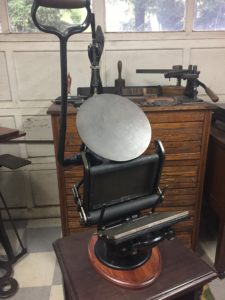C&P Pilot for sale
Completely restored Pilot. Considered one of the finest tabletops ever made. I have restored over 100 presses and I can say this one is a well made beast. You should not have to worry about any castings breaking while getting deep impression. It has the very desirable optional stirrup handle. Comes with my Falstrom adjusting gauge which allows the owner to adjust both impression and inking with ease. The size of the chase is 6-1/2″ by 10″. The rollers and trucks are new and unused. As with all my restorations you must come to my shop to pick up. I do not ship. My shop is 10 minutes from route 95 in Lyme, CT. I will help load into your vehicle, but, you are responsible for securing it to your satisfaction. The price is $2200.00. I will instruct you in how to use, adjust, and clean the press. You will get to print on it before your final purchasing decision. SOLD!
john.falstrom@att.net
Golding Official No. 4 for sale
My latest restoration is this Golding Official no. 4 with a 6 x 9 chase. This size is really the sweet spot for tabletop presses. Not too big, and not too small. It can produce really fine work. This press is a late model from the early 1900’s and it is an excellent example with no repairs or welds. It has all it’s original parts right down to the screws and wood board it is mounted on. New rollers and trucks. Included with all presses I sell is a printing lesson on the press you are buying and my Falstrom adjustment gauge that allows both impression and roller height setting with ease. I have restored over 100 presses. You can be assured a fully adjusted press that prints beautifully. Pickup at my shop in Lyme, CT. Sold and going to live in MA. john.falstrom@att.net
Restoring an 1878 Golding Jobber No. 7 (10 x 15)
It’s pretty clear from my website that I am a Golding enthusiast. You will find a lot of information I have gathered on the brand. I have restored over 100 presses in the last decade and the vast majority were Golding models. I have done a lot of research on Golding as a result. I also have found some pretty rare models often without realizing it at first. It’s great fun. I am thankful to have found this hobby after retiring from the sales world. It fits me very well and given me countless hours of pleasure. That said, I thought I knew most models as a result of my research efforts and hours of restoration. Then I saw this press on Ebay in March of 2021. It was labeled as a Golding Jobber and my first thought was no way.
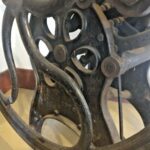 This is not a Golding. I know that model very well. It must be mislabeled. But no, it was in fact a Golding Jobber of a design I have never seen. Asking the letterpress community resulted in a similar reaction. No one had ever seen one that looked like this. So………I bid on it. I was the successful bidder, and my wife and I headed out to Lewisburg, PA to retrieve it. The drive was over eight hours total but the press was now in my garage safe and sound. Seen below is a copy of the original bill of sale for the press. It was sold on March 12, 1879 to a gentleman in Taunton, Ma. for the sum of $211, with the novelty of returning $11, making it an even $200. I purchased it on March 13, 2021 for $1250.00. A dollar in 1879 is now worth approximately $27.65 taking inflation into account. That means the press would cost about $5500 new in today’s dollars. Not an inexpensive purchase back then. Ten years after it was originally purchased it was sold to the family of the seller. It was in the possession of that family for 133 years until I purchased it.
The press is constructed much like the Old style Pearl in that the frame is bolted together. The treadle can be moved left or right to make it easier to treadle with either foot. There are many broken parts that need difficult repairs as well. I will take them one at a time and hopefully resolve each one. And so it starts!
This is not a Golding. I know that model very well. It must be mislabeled. But no, it was in fact a Golding Jobber of a design I have never seen. Asking the letterpress community resulted in a similar reaction. No one had ever seen one that looked like this. So………I bid on it. I was the successful bidder, and my wife and I headed out to Lewisburg, PA to retrieve it. The drive was over eight hours total but the press was now in my garage safe and sound. Seen below is a copy of the original bill of sale for the press. It was sold on March 12, 1879 to a gentleman in Taunton, Ma. for the sum of $211, with the novelty of returning $11, making it an even $200. I purchased it on March 13, 2021 for $1250.00. A dollar in 1879 is now worth approximately $27.65 taking inflation into account. That means the press would cost about $5500 new in today’s dollars. Not an inexpensive purchase back then. Ten years after it was originally purchased it was sold to the family of the seller. It was in the possession of that family for 133 years until I purchased it.
The press is constructed much like the Old style Pearl in that the frame is bolted together. The treadle can be moved left or right to make it easier to treadle with either foot. There are many broken parts that need difficult repairs as well. I will take them one at a time and hopefully resolve each one. And so it starts!
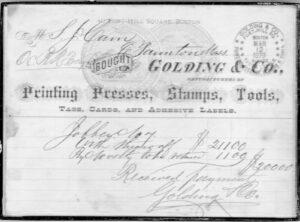 Click on this original bill of sale to go to the restoration story.
Click on this original bill of sale to go to the restoration story.
Golding Pearl card dropper video
This was an accessory supplied with the Pearl press. The purpose was to speed output by eliminating the need to remove the printed card. After it was printed, it dropped into the first drawer of the base below. You then just had to place the next blank sheet in the press. I am unaware of any other examples of this rare accessory.
Universal platen press
The Rev. Merritt Gally patented his Universal Printing Machine in 1869. It was a vast improvement over the Gordon platens then used for job printing, superior in both inking and impression, and before long, competitors were selling many versions. Most famous in the US was the Colt’s Armory, and in Europe the Victoria was perhaps the best known. Once cylinder presses became the most efficient machine in letterpress printing, these slow platens were sometimes relegated to diecutting (for which they are still made today), but they remained the most desirable press for fine press printers. Many award-winning fine press books were printed on such presses as the Gally Universal, the Hartford, the Laureate, the National, the Colt’s Armory, the Victoria, the Phoenix, the Thomson, the Sun, the Mitre, the Bremner, and the Gietz (the last in production). As a class of machine they were referred to as Heavy Art Platens, as parallel-impression or parallel-approach or as rolling-sliding platens.
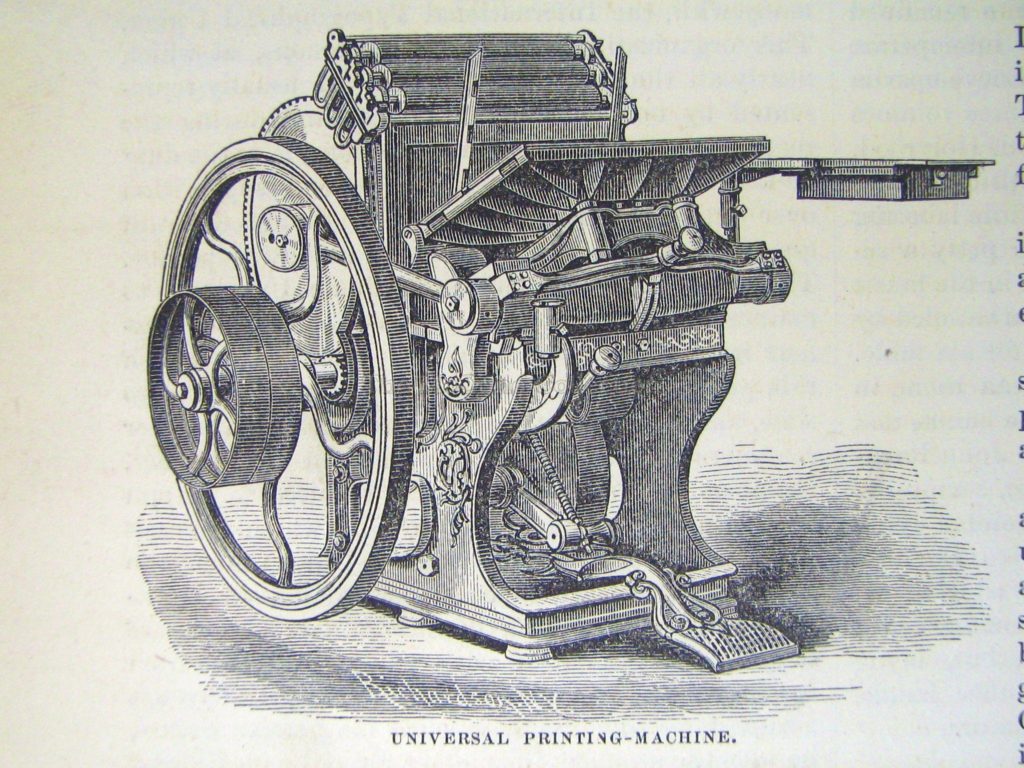 Merritt Gally Universal
The following files were put here for your use:
Colts_Armory_JTPCDownload
Colts_Laureate_RollerSpecDownload
ColtsArmory_Laureate_JTPC-1Download
colts-and-thompson-press-statsDownload
illustratedcatal00john_1Download
VICBOOK1Download
AutoVic.reinstallingDownload
Merritt Gally Universal
The following files were put here for your use:
Colts_Armory_JTPCDownload
Colts_Laureate_RollerSpecDownload
ColtsArmory_Laureate_JTPC-1Download
colts-and-thompson-press-statsDownload
illustratedcatal00john_1Download
VICBOOK1Download
AutoVic.reinstallingDownload
My search for, and refurbishing of, a Merritt Gally Universal press
I have always wanted a parallel platen press from the day I discovered they existed. Those that are familiar with the concept know it is a significant improvement from a typical clamshell type press. The most famous was of course the Colt’s Armory press. Named after the manufacturer, Colt’s Armory in Hartford CT. When I first decided I was going to find one, it was that brand press that I sought out. I was thinking it should not be too difficult. I’m in CT. and have a lot of contacts. Boy, was I wrong. Being a Golding enthusiast and looking for Golding presses in New England was not difficult at all. I’ve now restored over 75 of them and still going. I passed up many as well. This type press was a whole different story. Vastly fewer numbers exist today, and those that own one don’t let them go very often. As I sought out more information about this class of press, I learned the story of how Merritt Gally was the first, and how he and John Thomson fought, and how Thomson ignored Gally’s Patents and began building a improved version of Gally’s original that we know as the Colt’s Armory press. I realized I liked the Gally press just as much as the Colt’s, but, it seemed even rarer. 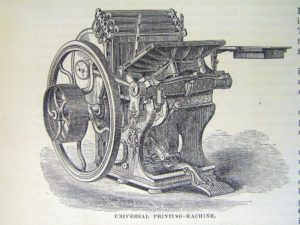 What were the chances I could find one of those. It didn’t seem like good odds. Then, one day an ad appeared for a Gally Universal in Greenfield, MA. about two hours from my house. I went up to see it with great enthusiasm. It didn’t disappoint. It was a beautiful example of a 10 x 15 motorized Gally Universal. It had a few welds, but, beggars can’t be choosers. I told the owner I wanted it. That’s when I learned he was only taking bids. I had one shot. Give him a number, and if it was the highest, it was mine. He was keeping the bidding open for about a month as I recall. I offered what I thought was a good number. Well, I was not the winner. No recourse. It was gone. I was really disappointed. I continued to look, and after several years went by, I found another press in a local print shop very nearby in Essex, CT. This one was a Thomson Universal 13 x 19 without motor or treadle. It was huge, and not as attractive as the Gally I had missed earlier. I could not bring myself to bring this monster home. Just too darn big. I would continue my search for the perfect parallel platen press. Another year passed and a press I wasn’t aware existed was advertised on Briar press.It was a Hohner Din A4, 10 x 15 motorized press. As I researched it I began to realize this was a great opportunity. It likely is the most modern parallel platen available. It was made in 1979 and imported from Germany by The American Printing Supply Co. in NYC. It really seemed unique. I decided to make the purchase and had it shipped from CA. As is the case with many press shipments, it did not go well, and they did a great deal of damage to it. Fortunately, one of my good friends is a master machinist with just the right skill set combined with my skills to repair and restore everything that occurred during shipping. The restoration of the Hohner will be written up in a separate post.
What were the chances I could find one of those. It didn’t seem like good odds. Then, one day an ad appeared for a Gally Universal in Greenfield, MA. about two hours from my house. I went up to see it with great enthusiasm. It didn’t disappoint. It was a beautiful example of a 10 x 15 motorized Gally Universal. It had a few welds, but, beggars can’t be choosers. I told the owner I wanted it. That’s when I learned he was only taking bids. I had one shot. Give him a number, and if it was the highest, it was mine. He was keeping the bidding open for about a month as I recall. I offered what I thought was a good number. Well, I was not the winner. No recourse. It was gone. I was really disappointed. I continued to look, and after several years went by, I found another press in a local print shop very nearby in Essex, CT. This one was a Thomson Universal 13 x 19 without motor or treadle. It was huge, and not as attractive as the Gally I had missed earlier. I could not bring myself to bring this monster home. Just too darn big. I would continue my search for the perfect parallel platen press. Another year passed and a press I wasn’t aware existed was advertised on Briar press.It was a Hohner Din A4, 10 x 15 motorized press. As I researched it I began to realize this was a great opportunity. It likely is the most modern parallel platen available. It was made in 1979 and imported from Germany by The American Printing Supply Co. in NYC. It really seemed unique. I decided to make the purchase and had it shipped from CA. As is the case with many press shipments, it did not go well, and they did a great deal of damage to it. Fortunately, one of my good friends is a master machinist with just the right skill set combined with my skills to repair and restore everything that occurred during shipping. The restoration of the Hohner will be written up in a separate post.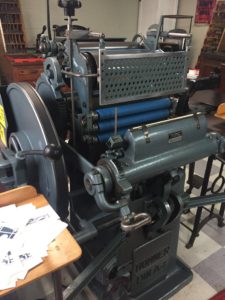
Now that I had a really nice parallel platen press I thought I would stop thinking about that beautiful Gally press that got away. Well, I didn’t, and as luck would have it, I connected with Jim Macnab who runs the print shop at the Shaker Village in Canterbury, NH. He had been hunting for parts for a Gally Universal he was restoring for the Village. I kept seeing his name during my searches for a Colt’s/Gally press. Jim had an early example of a Gally, and he wanted me to buy it! 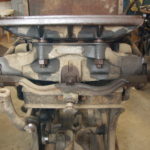 He had been restoring it when he was offered another Gally press that was in better condition. Jim had already done some of the preliminary work necessary to bring the press back. It was in the primer seen when I took over the restoration.
He had been restoring it when he was offered another Gally press that was in better condition. Jim had already done some of the preliminary work necessary to bring the press back. It was in the primer seen when I took over the restoration.
So, now I owned two, the Gally and the Hohner. The first and most likely the last parallel platen presses to be manufactured. This was going to be quite a project however. It had no means of propulsion( motor or treadle), and, it had many missing and broken parts. I didn’t care. It was beautiful, and I would take one step at a time and see what I could do. Another, really big help was that Jim loaned me some parts from his new press to help me recreate missing parts for mine. We did this over the winter when the Shaker Village was closed. During one of the many conversations I had with Jim he mentioned the frustration he was having because of the difficulty in treadling his press. 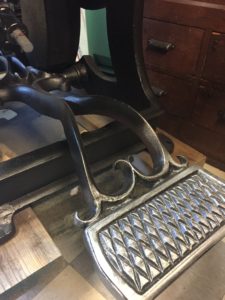 I mentioned I had a nice variable speed motor that might be fitted to his press and we both realized we wanted what the other possessed. A trade was done. My motor for his treadle. The treadle was originally on my press and now was to be reunited. The propulsion problem was solved. I tackled each problem and worked through what I thought was the best solution. New silicon bronze castings were made from the originals when needed. I use bronze rather than cast iron because I have a great relationship with Sher at the Mystic River foundry in Mystic, CT. They do not work with cast iron. Sher helped me immensely, and silicon bronze is a great material as it machines well and is not as brittle as cast iron. I needed to cast both feed and delivery supports. On the delivery side I didn’t have anything to go by for one needed piece so I carved a new one out of pine to use as a pattern for the casting. I visually copied what I could find in the few images available online. Another bit of good fortune provided four special 1/2-14 tpi screws needed to attach the new feeder and delivery brackets. A couple of years ago Ken Kulakowsky of the .918 Club brought me a Pearl to restore for his museum. With it was a small box of nuts and bolts he thought went with the Pearl. They didn’t, but, they were old so I saved them. In that box were four odd screws with the special thread that I needed for the Gally. The exact number, the correct length, and the correct rare thread. 1/2” bolts usually have 13 tpi, not 14 tpi. I needed feed and delivery boards to be made and again as luck would have it, a good friend, Don Gerber came to me to get some letterpress business cards for his wood turning hobby. I suggested we barter each others services. I printed his business cards, and he fabricated the needed boards including the little drawer on the feed board. He purchased an old oak furniture piece and used parts of it to make the boards look authentic. As seen in the following pictures, several other parts were repaired by brazing. You can see the gold metal shaped to it’s original contours.
I mentioned I had a nice variable speed motor that might be fitted to his press and we both realized we wanted what the other possessed. A trade was done. My motor for his treadle. The treadle was originally on my press and now was to be reunited. The propulsion problem was solved. I tackled each problem and worked through what I thought was the best solution. New silicon bronze castings were made from the originals when needed. I use bronze rather than cast iron because I have a great relationship with Sher at the Mystic River foundry in Mystic, CT. They do not work with cast iron. Sher helped me immensely, and silicon bronze is a great material as it machines well and is not as brittle as cast iron. I needed to cast both feed and delivery supports. On the delivery side I didn’t have anything to go by for one needed piece so I carved a new one out of pine to use as a pattern for the casting. I visually copied what I could find in the few images available online. Another bit of good fortune provided four special 1/2-14 tpi screws needed to attach the new feeder and delivery brackets. A couple of years ago Ken Kulakowsky of the .918 Club brought me a Pearl to restore for his museum. With it was a small box of nuts and bolts he thought went with the Pearl. They didn’t, but, they were old so I saved them. In that box were four odd screws with the special thread that I needed for the Gally. The exact number, the correct length, and the correct rare thread. 1/2” bolts usually have 13 tpi, not 14 tpi. I needed feed and delivery boards to be made and again as luck would have it, a good friend, Don Gerber came to me to get some letterpress business cards for his wood turning hobby. I suggested we barter each others services. I printed his business cards, and he fabricated the needed boards including the little drawer on the feed board. He purchased an old oak furniture piece and used parts of it to make the boards look authentic. As seen in the following pictures, several other parts were repaired by brazing. You can see the gold metal shaped to it’s original contours.
-
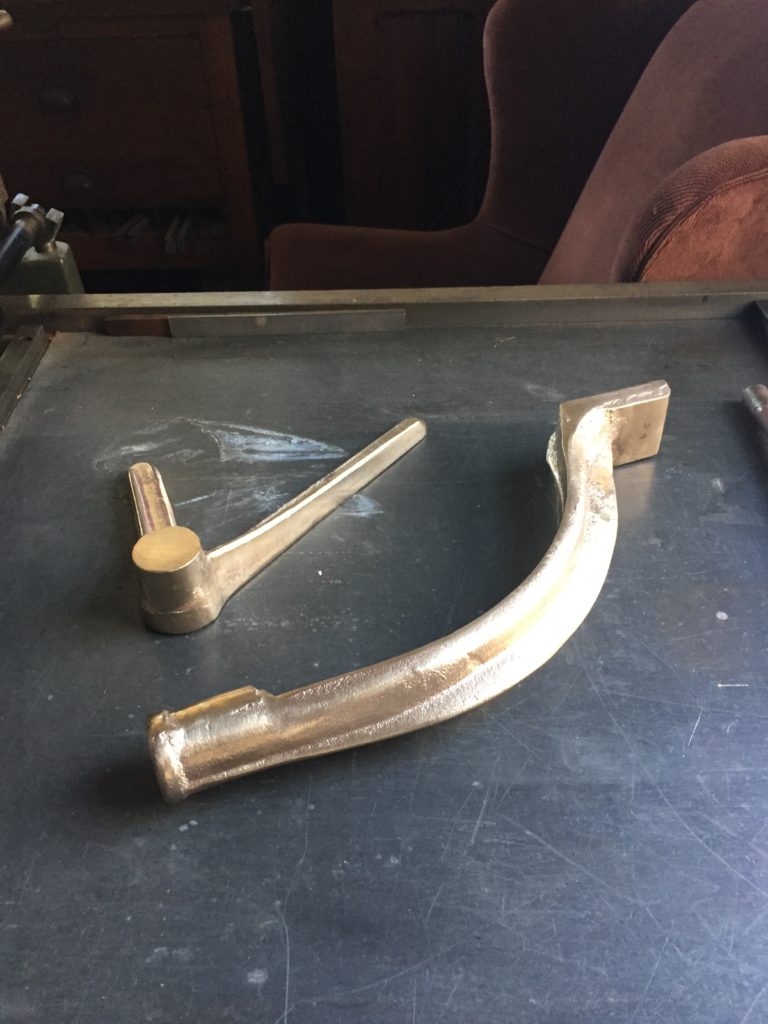 Silicon bronze castings
Silicon bronze castings
-
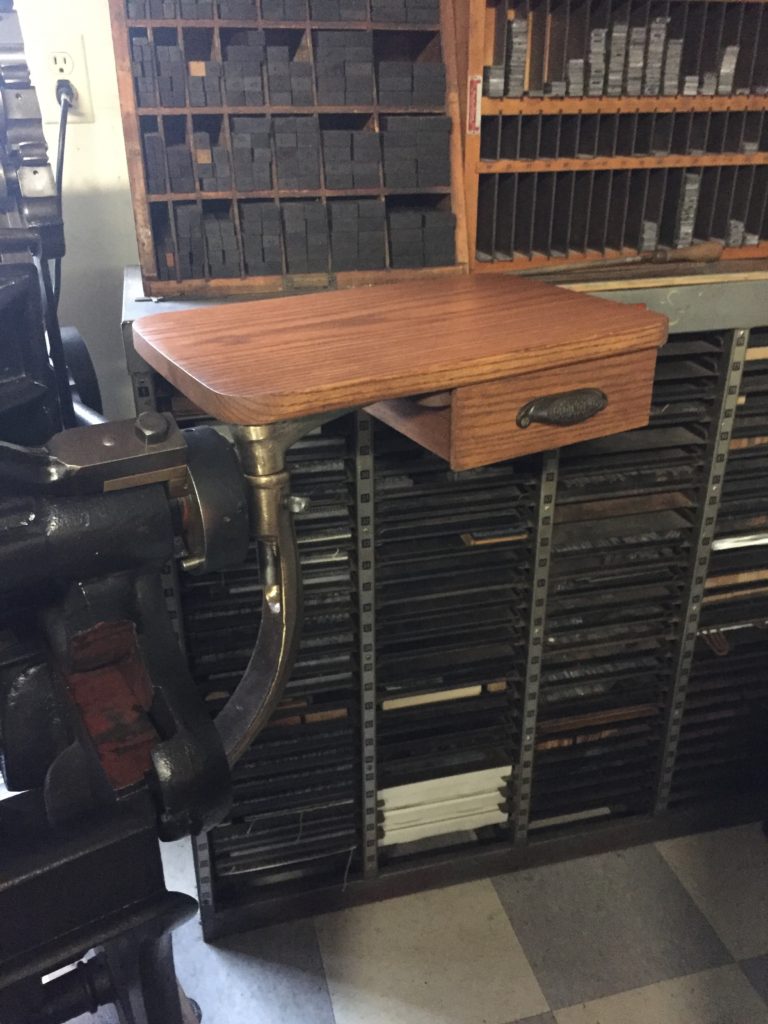 Feed board
Feed board
-
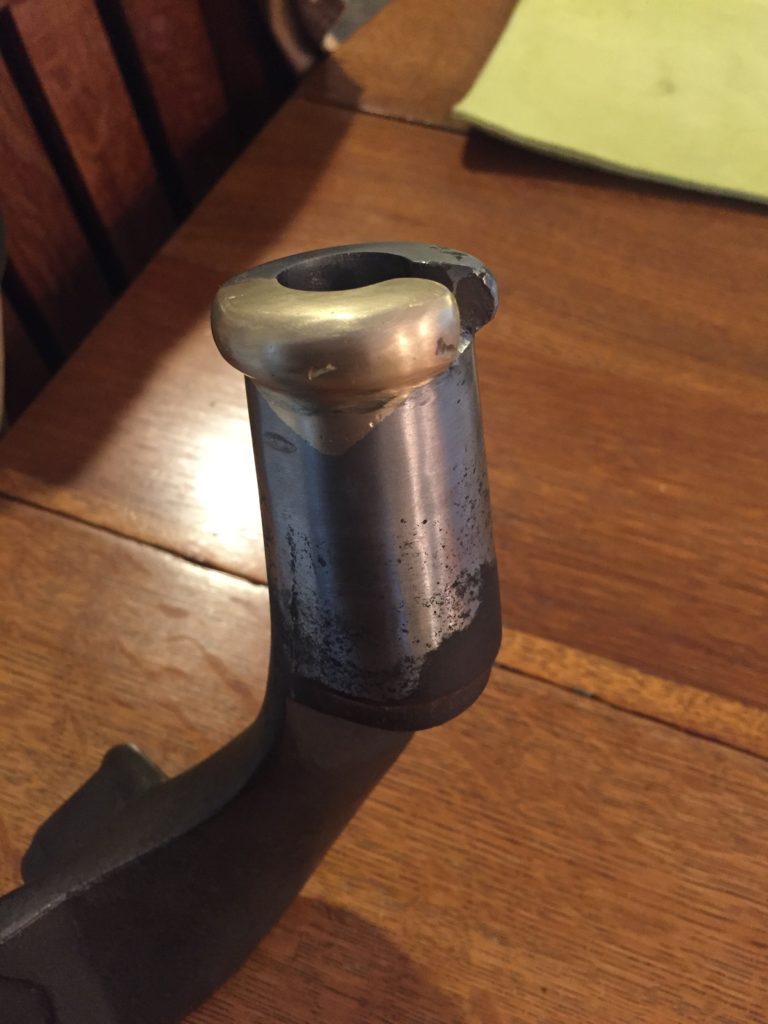 Brazed support
Brazed support
-
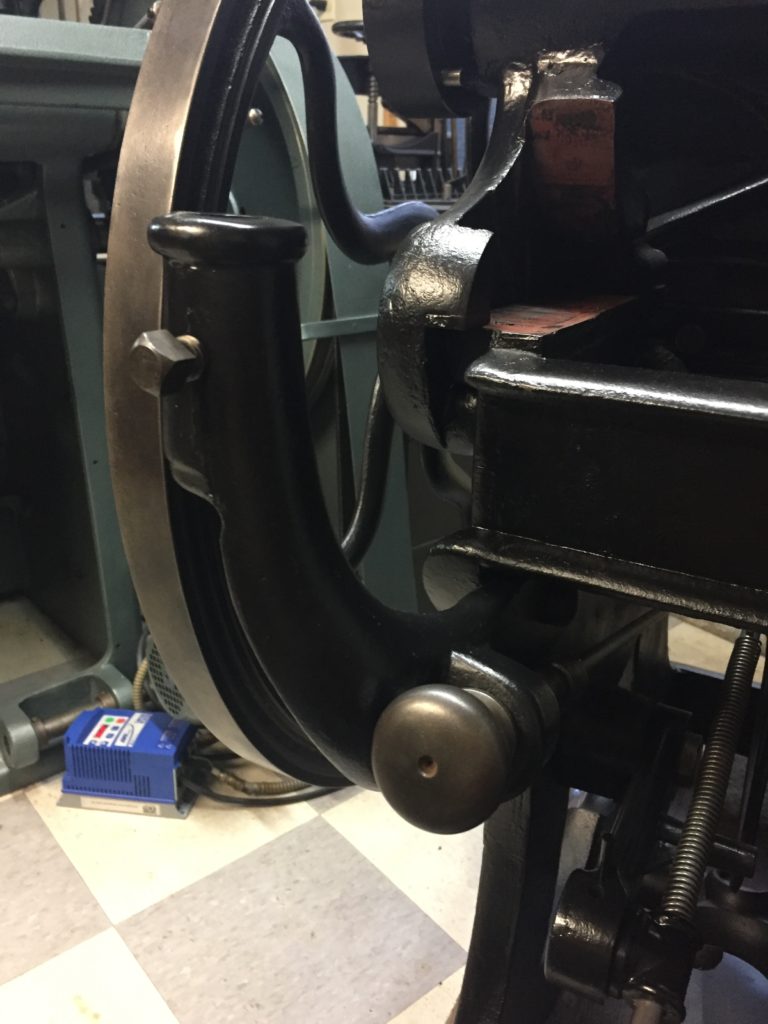 Delivery support
Delivery support
-
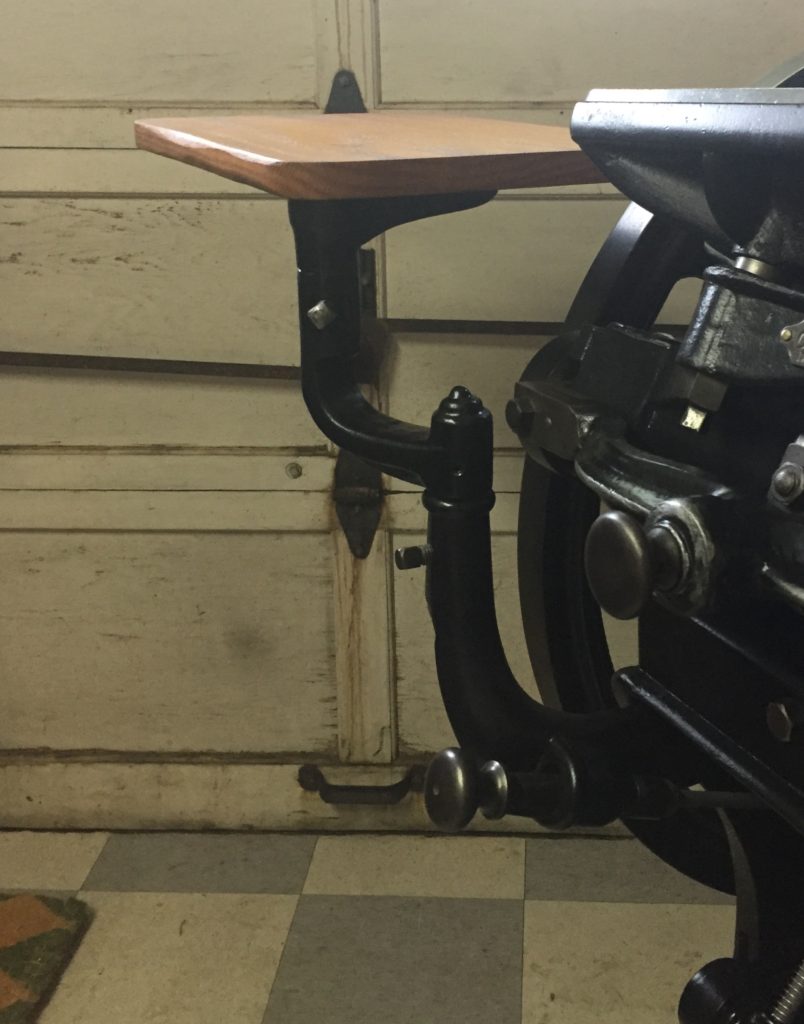 Delivery board
Delivery board
-
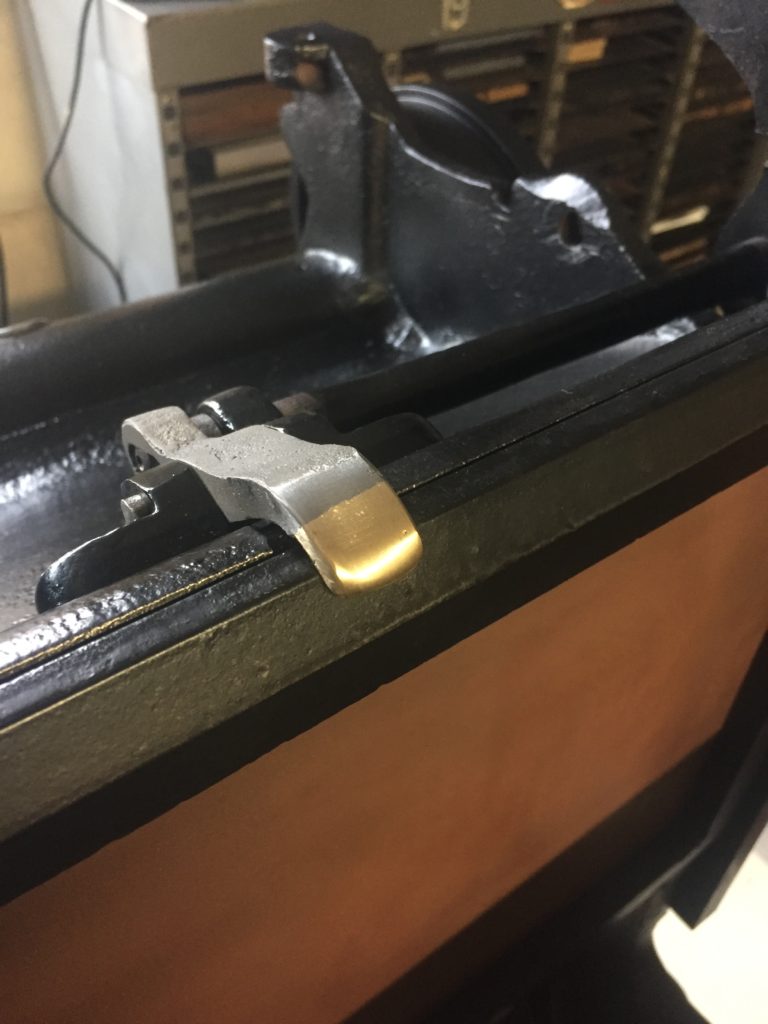 Brazed chase latch
Brazed chase latch
-
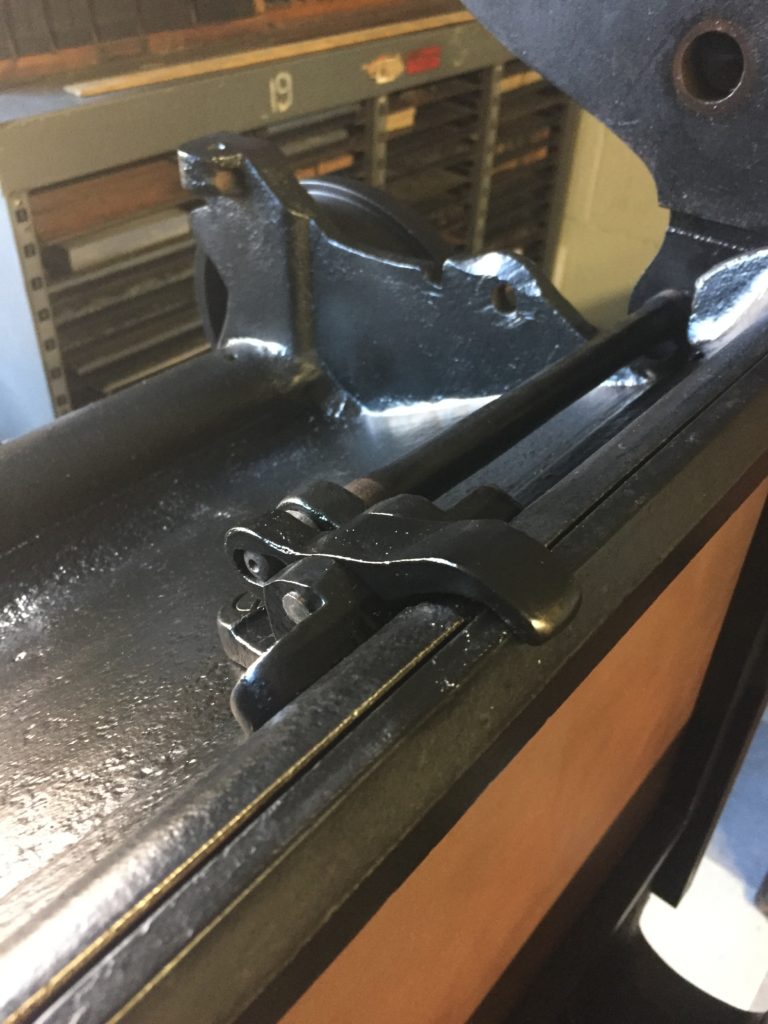 Repaired chase latch
Repaired chase latch
-
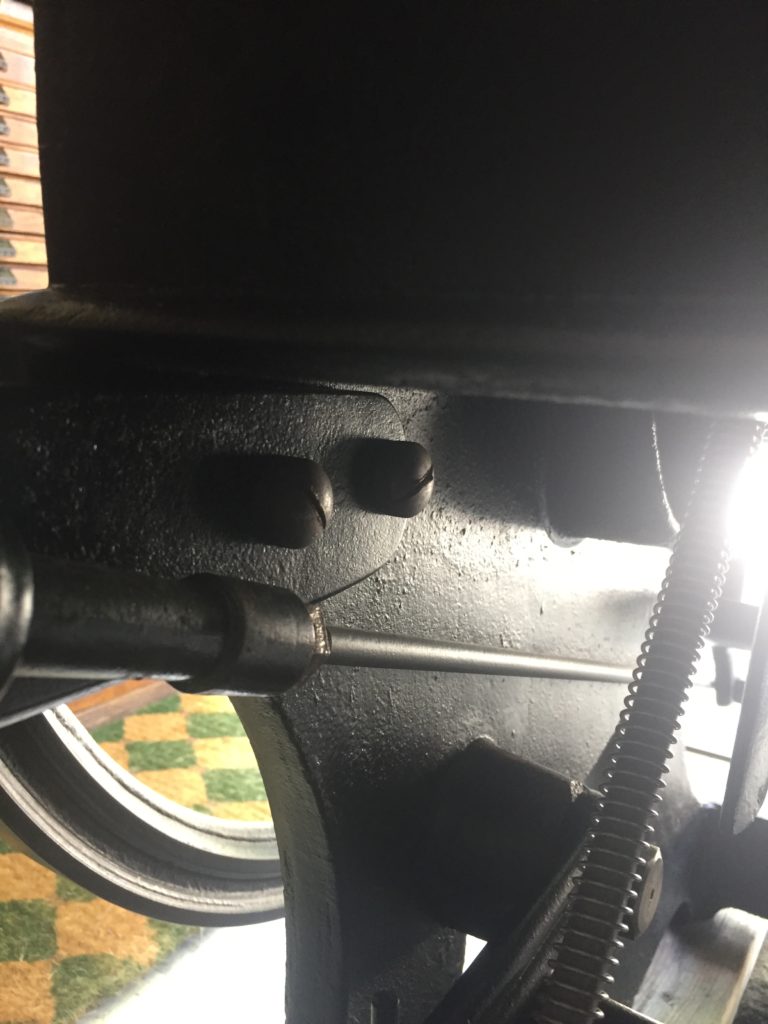 Special thread screws
Special thread screws
There was no chase with the press so we shaved off 50 thousandths from a C & P 10 x 15 chase and repaired the break. It fits perfectly. That trick came from Jim Macnab. The roller trucks were missing and by a stroke of good fortune a perfect set was found at John Barrett’s Letterpress Things. John and I were both amazed at the find, but, that’s what happens when you dig around in his vast letterpress store. You find letterpress things.
-
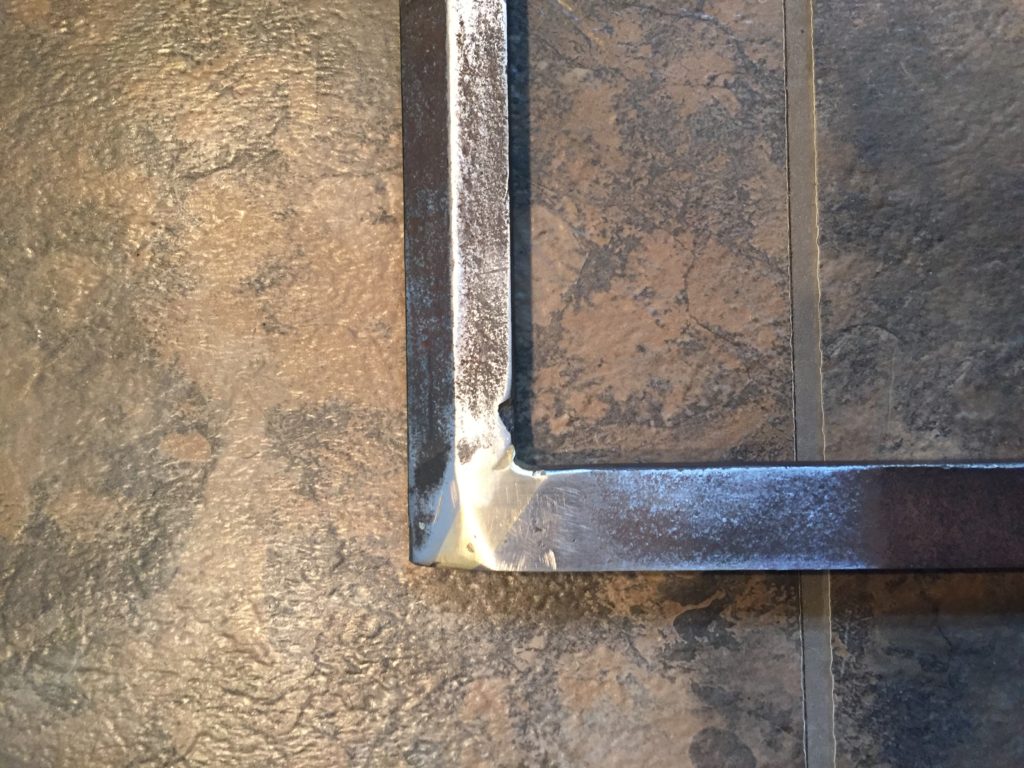 Brazed repair of the chase
Brazed repair of the chase
-
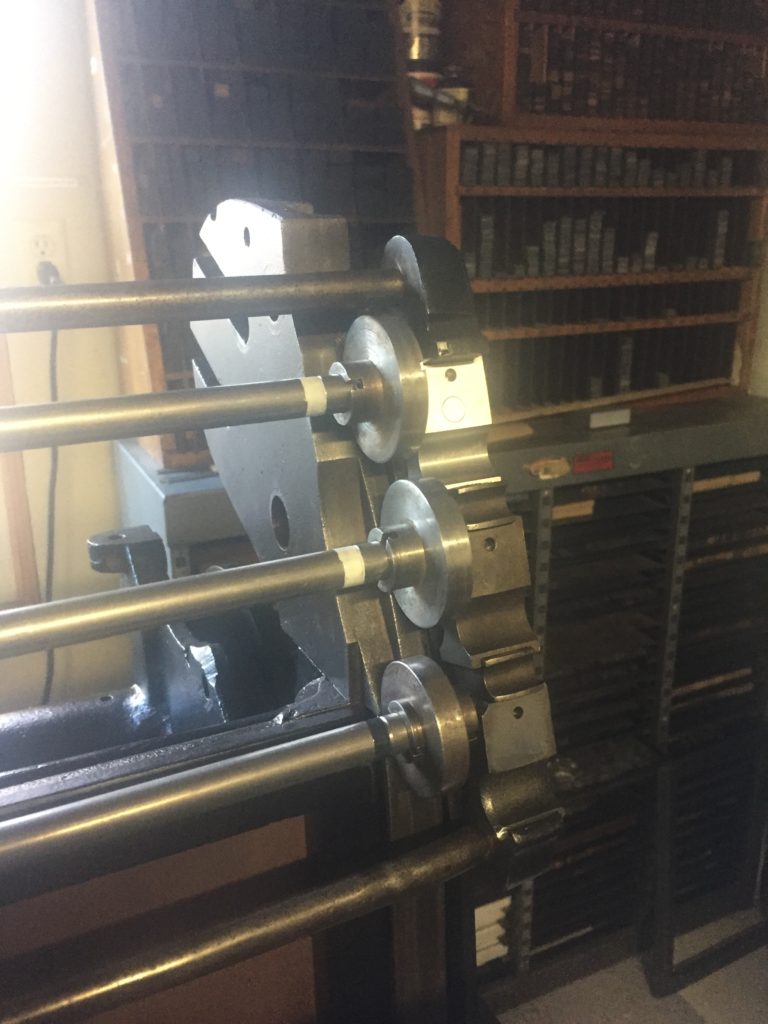 Roller trucks
Roller trucks
In addition to repairing broken parts and casting replacement parts, new parts needed to be fabricated outright. The first was a new roller saddle out of a block of steel. The press is supposed to have six, and mine came with five. This was a job for my machinist, Rich Sutton. What he fabricated is as good as the originals. Even more difficult was creating a oscillating roller. It had to be done from scratch also. I designed it to utilize the worm and dog from a modern offset press. This way if the worm and dog that causes the oscillation wear out, they can easily be replaced. The actual fabrication was again, a job for Rich. He did not disappoint.
-
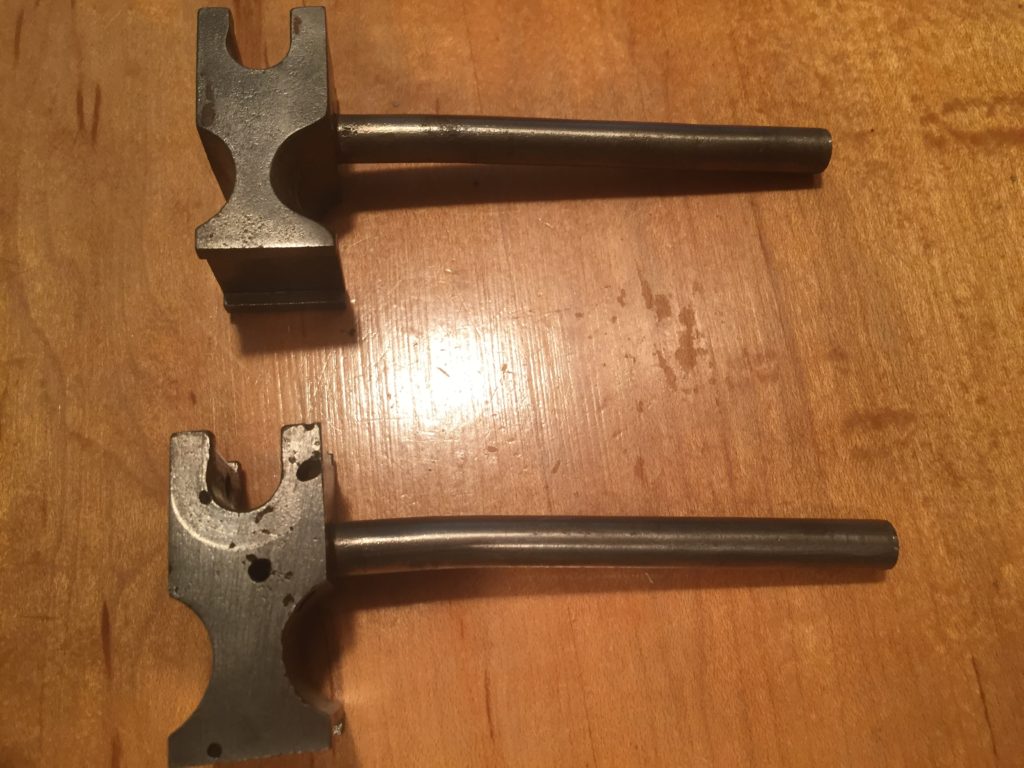 Original roller saddles (bent)
Original roller saddles (bent)
-
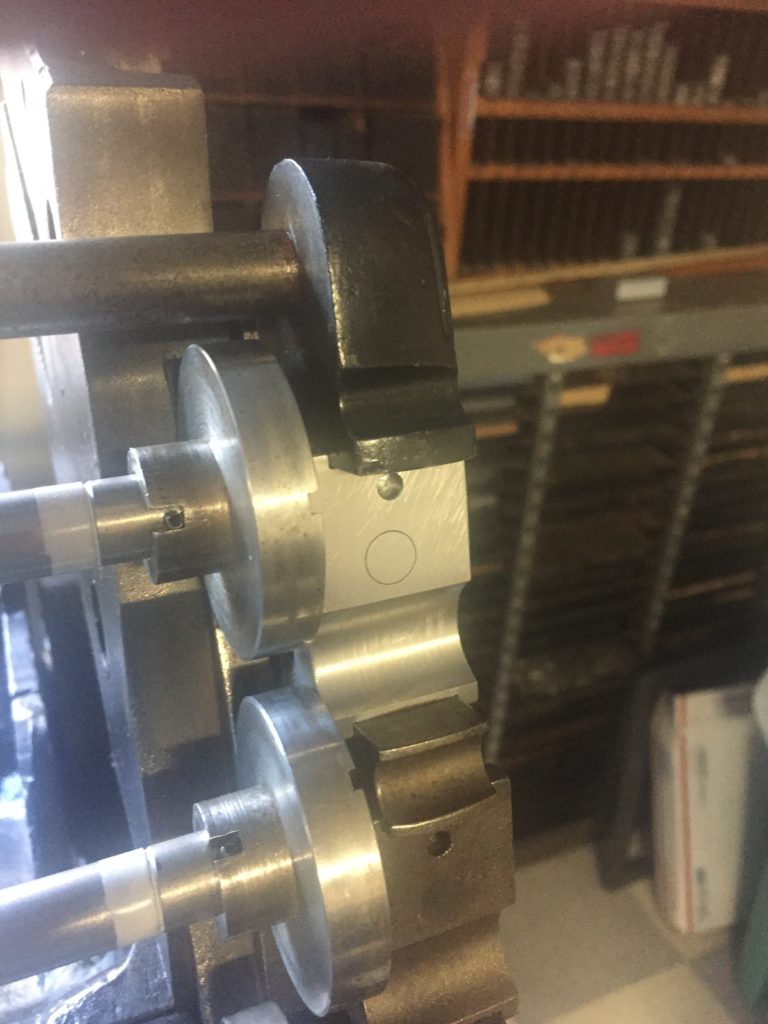 New roller saddle
New roller saddle
-
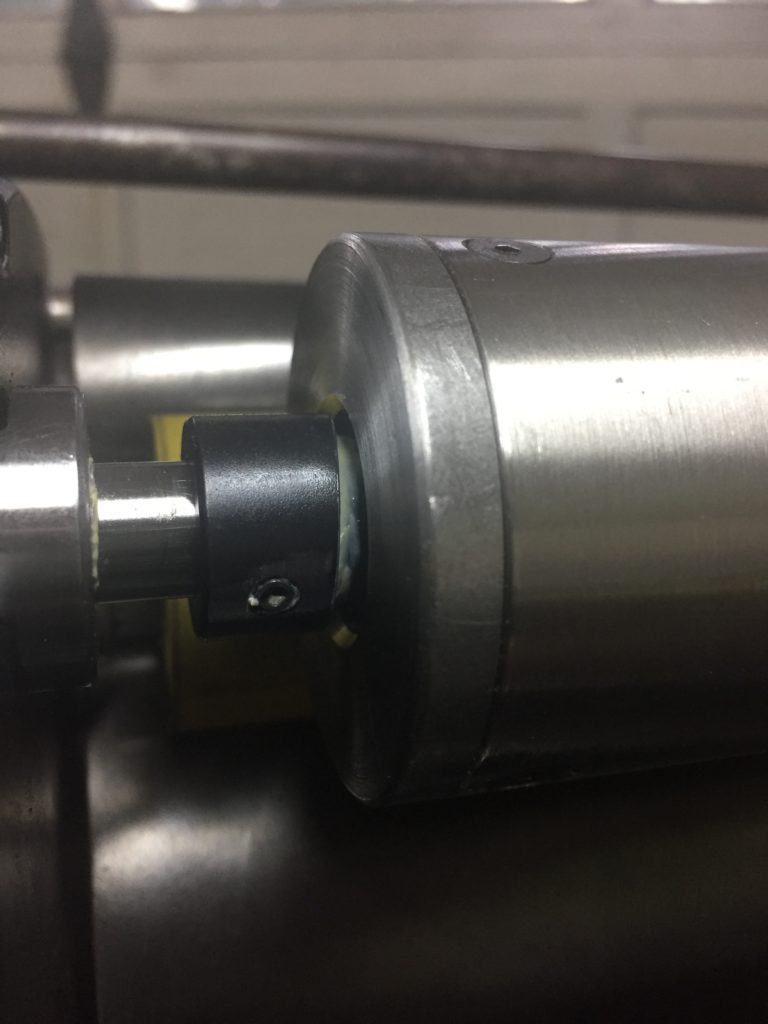 Oscillation roller detail
Oscillation roller detail
-
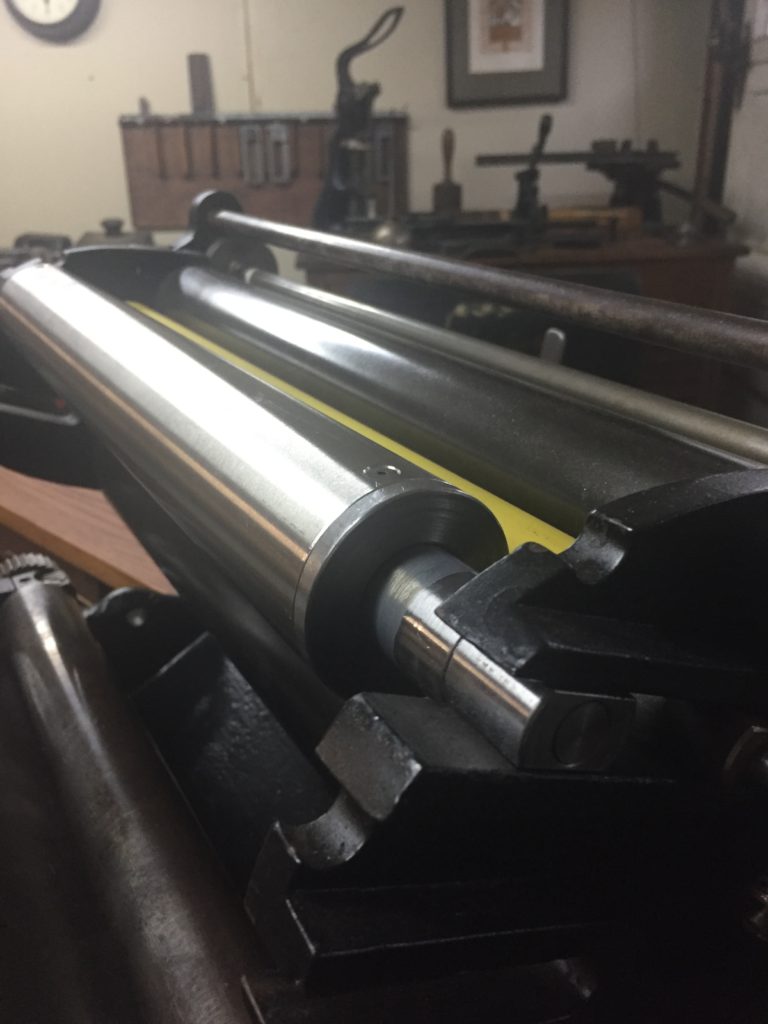 Oscillating roller
Oscillating roller
So the press is coming along really well. One thing that was on my wish list that was proving to be very difficult was finding an ink fountain. Few people use an ink fountain today, but, It just looked like something was missing. I wanted it for those aesthetics. Enter Jim Macnab once again. He had a beautiful fountain that came with his new press and graciously was willing to do another trade this time for some parts for his Golding presses he needed. Without Jim none of this would have been possible.
-
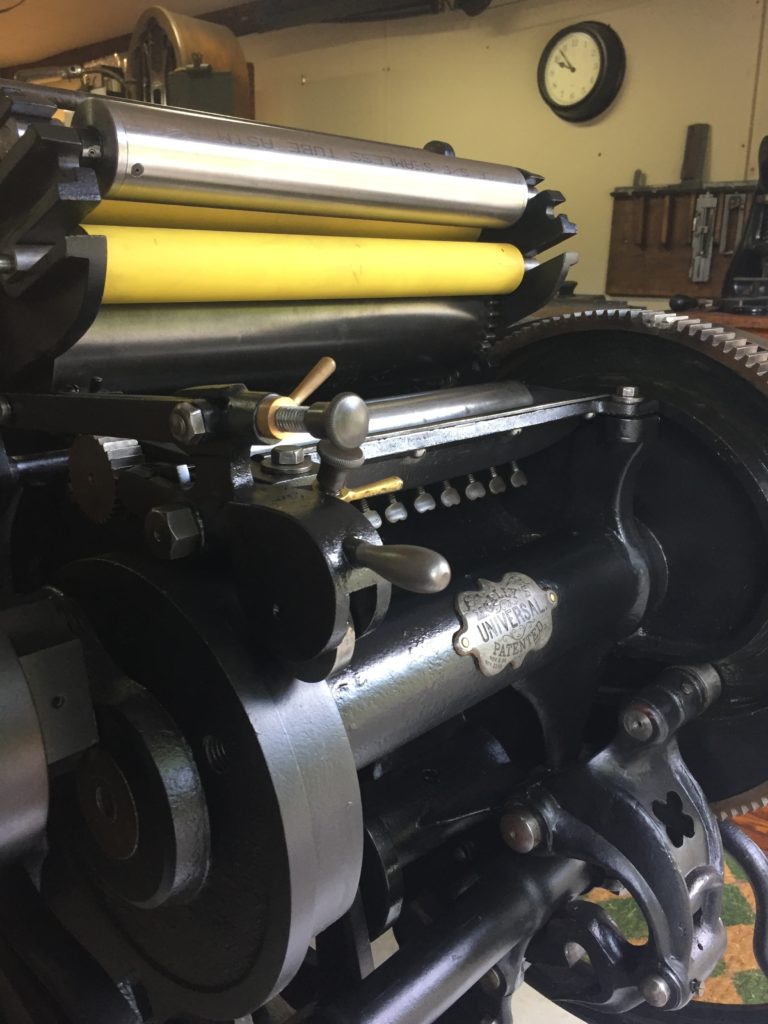 Merritt Gally Universal fountain
Merritt Gally Universal fountain
So now the press is complete except for getting the rollers covered. It has responded so well, that I have decided to take it all apart again and rebuild the worn drive parts, so that it functions as well as it looks. Jim Macnab had already replaced some large pins that were severely worn, but, there is still a number of areas that are in need of help.
I didn’t do it originally because I was not at all sure I could find or make what I needed to complete the press. I thought it may just be a looker. Now, unbelievably, it is complete, and I know it can do what it was intended to do. With that in mind, it deserves the time and money to complete the job right. So, here we go again. First and most obvious is the worn pinion gear. Rich will turn down the existing gear as it’s part of the shaft, and install two new gears connected together side by side, and key them to the area where the original gear was. We’re using two gears because of a $2100 cost savings. One custom gear vs two stock change gears. If you look at the gear pictures you’ll see that the two stock gears put together are the exact width of the original gear. How much more luck will I have? Feels like I’ve already had more than my share. After the gear replacement I’ll assess the tightness of the press. I have identified several other potential spots that may benefit from replacing parts that are out of what I consider to be good tolerances.
-
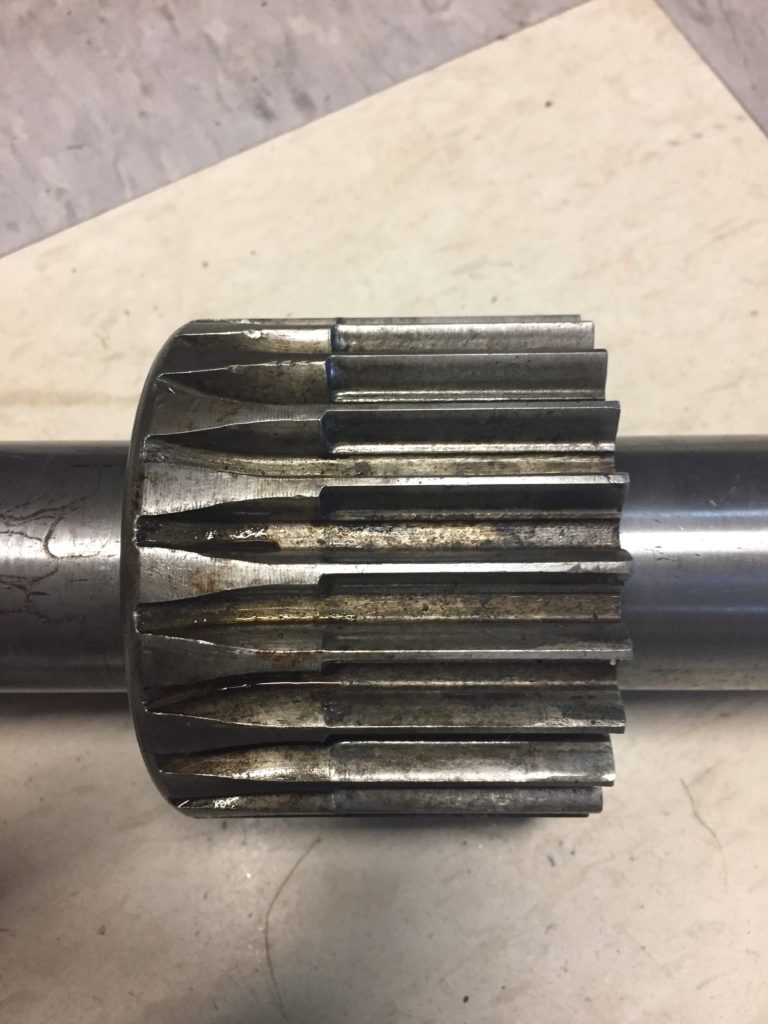 Original worn gear
Original worn gear
-
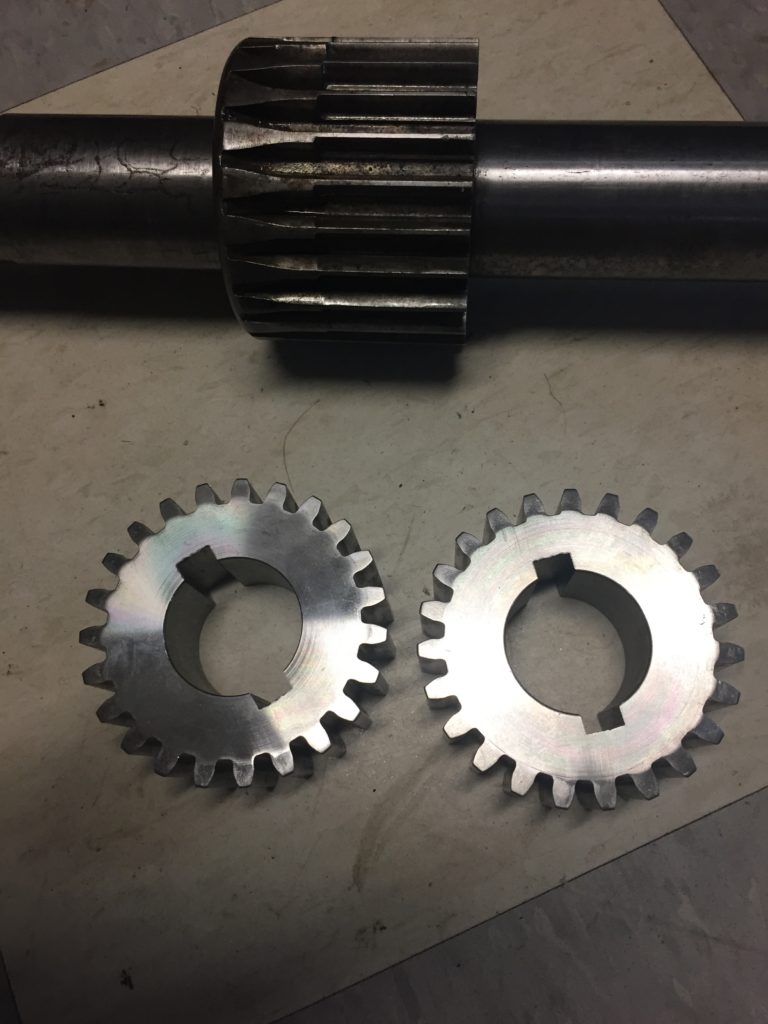 Two new spur gears
Two new spur gears
-
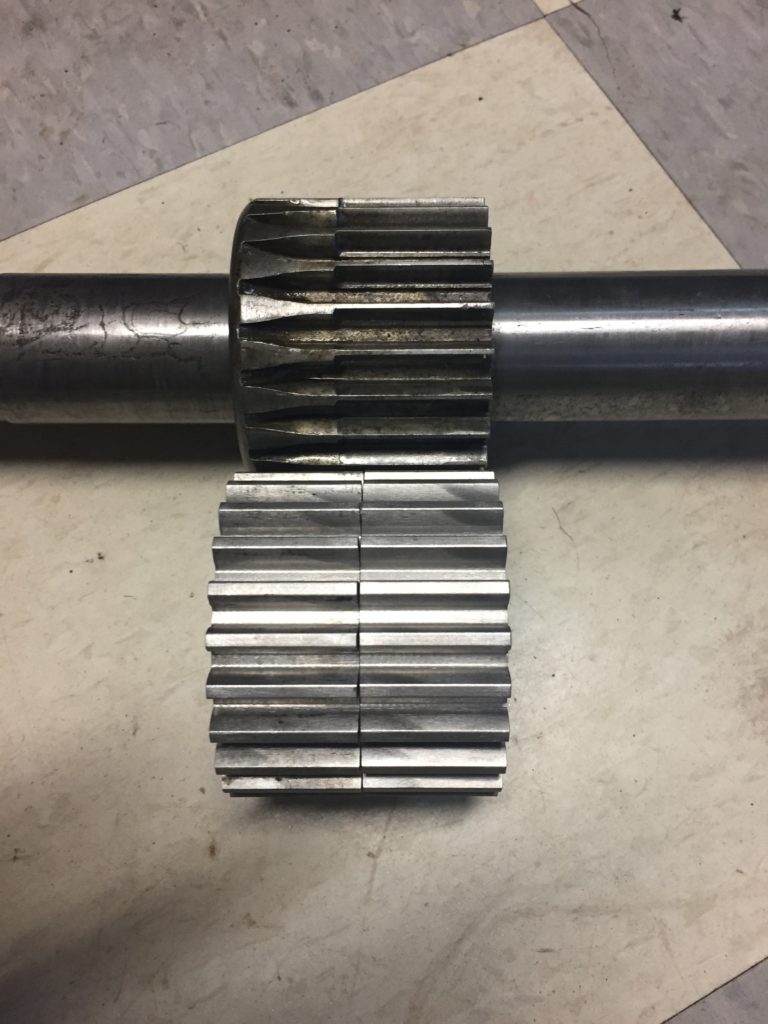 8 dp, 23 tooth, 14.5 pa gears
8 dp, 23 tooth, 14.5 pa gears
To be continued……
Golding Official No. 3 for sale
Currently available is this fully restored Golding Official No. 3 (5×8) tabletop press. The press has new rollers and trucks. Golding is one of the best engineered presses available and is capable of printing a larger portion of the chase than lesser brands. The bad news for those of you some distance from my shop in Connecticut is that I do not ship. Too many presses get broken in shipping. You must come to my shop to pick up. The good news is that my shop is easy to get to 10 minutes off route 95 and you will get to print on the press before your final buying decision. You will get an introductory lesson on printing and learn how to adjust and maintain your press. Stay as long as you like and have all your questions answered. Peace of mind. A great starter press, or addition to a shop in need of a smaller job press. john.falstrom@att.net This press is sold and living in Essex, CT. Thank you
